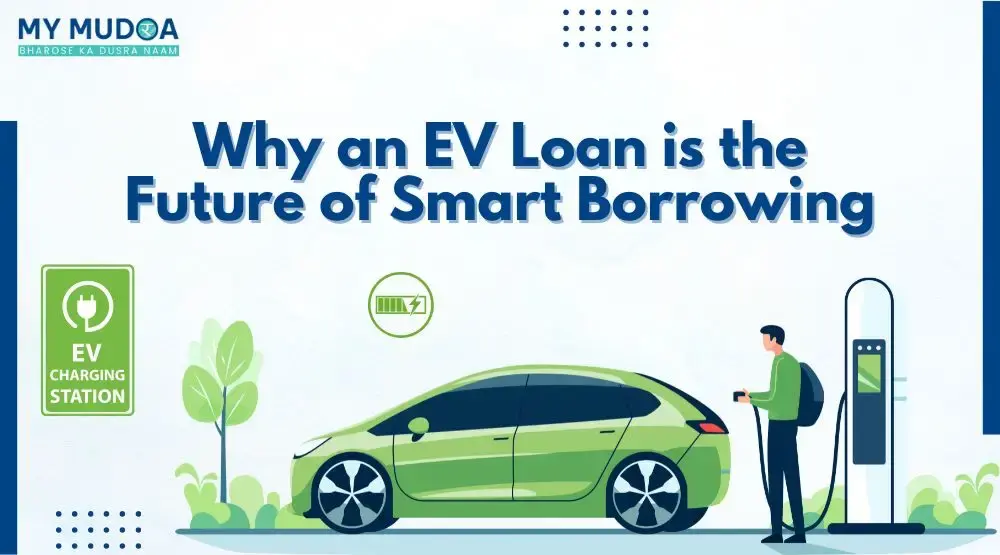
"Switch to smarter, greener commuting with an electric vehicle loan. Know how EV loans, tax benefits in India & green car loans make eco-friendly choices affordable."

Published: 25 June 2025
Updated: 26 June 2025
In the process of purchasing an automobile, achieving a dream that is close to many, we forget to take all our options into consideration, such as “Should I buy an EV or a normal car?” or whether or not we should get it financed through an Electric Vehicle Loan.
Today, we’ll break down the process and make the decision-making process easy for you.
Let us first understand what an EV Loan even is. An Electric Vehicle Loan also known as a green car loan, is a financial product that a borrower may opt for in the event that he or she decides to purchase an electric vehicle.
- Lower Interest Rates: An EV Loan is inherently less expensive, typically comes with interest rates that are 0.25% to 1% lower than regular car loans.
- Lower Risk for Lenders: EVs are considered low-risk because they show less wear and tear and have reliable battery life, leading to more affordable loans.
At the introduction of EVs into the markets of India, the central as well as state governments released a large number of incentives to attract customers, such as tax exemptions and subsidies, in both the cost of the electric vehicle and the payable interest.
The central government, in accordance with section 80EEB of the Income Tax Act, offers a tax deduction on interest paid up to 1,50,000 on the purchase of an Electric Vehicle only.
These tax rebates and other small incentives have influenced buyers to shift from petrol/diesel vehicles to the more sustainable EV (electric vehicle) option.
Other than the fact that an EV is easier on the wallet, there are a few other positives to purchasing an EV:
1. The cost of charging an EV is less costly than filling a tank of Petrol/Diesel.
2. An EV Battery needs less maintenance on average as compared to other car engines.
3. EVs do not require a Pollution Under Control (PUC) Report as they do not emit exhaust gases.
4. EVs reduce the overall amount of noise pollution in an area.
5. While the initial cost incurred of owning an EV may be higher, the overall savings accumulated over the lifespan of the vehicle more than make up for the slightly higher price tag.
6. As an EV Loan is a secured loan, it entails all the benefits of a secured loan, such as lower interest rates, longer loan tenures, a choice between fixed rate and variable rate, and it also increases your credit score if the installments are consistent.
1. Applicant must be between 21-65 years of age
2. Applicant must not be above 65 years at the end of the loan term
3. Applicants must have a minimum income of 3L per annum
4. Borrowers must have a credit score (CIBIL) of 730-900.
5. Borrowers must be able to produce PAN card, Aadhar card, and proof of residence on demand.
My Mudra offers a seamless loan procurement experience by connecting you with top banks.
|
Bank Name |
Interest Rate |
Loan Amount |
Tenure |
Processing Fee |
|
HDFC Bank |
From 9.20% |
=< 10 Cr. |
12-96 months |
1% |
|
ICICI Bank |
From 9.10% |
=< 30 L |
Up to 96 months |
2500-5000 |
|
Axis Bank |
From 9.20-13.90% |
Up to 85% of total cost |
12-84 months |
3500-12000 |
|
Kotak Bank |
From 7.35-14.00% |
Up to 100% of on road price |
12-84 months |
2.50% |
|
SBI Bank |
From 9.10% |
Up to 90% of total cost |
Up to 96 months |
1000 + GST |
With the increasing and growing popularity of EV’s in India, many banks have started offering EV Loans which might make the task of choosing the best loan a daunting task. My Mudra makes the process of choosing an EV Loan easy by explaining the nuances of each, making it easy to come to a decision between an EV Loan and a traditional Car Loan.
Also Read:
- How Green Finance Can Be a Sustainable Choice for Your Home
- Why Choose a Personal Loan to Buy a Car in India?
Ans: EV Loans provided depend on the needs of the borrower, making it difficult to designate a bank as the best EV Loan provider. But some highly regarded EV Loan providers are GDFC Bank, ICICI Bank, and Union Bank of India.
Ans: The interest rates levied on an EV Loan differ between banks, but they commonly range from 8.70%-9.20%.
Ans: An EV Loan is a loan created specifically to finance an electric vehicle.
Ans: An EV loan is a loan at the end of the day; therefore, a strong credit score will help you immensely in procuring a loan.
Ans: An EV Loan lasts on average between 5-7 years, but may be extended up to 8 years.
Ans: With the release of newer and more efficient EV models, the lobby behind EV growth only grows in popularity, and the use of EVs as transport will only become more widespread.
💬 Comments
Leave a comment or ask a question!
Please Enter Your Name
Please Enter Your Email
Please Enter Your Phone
Please Write Your Comment